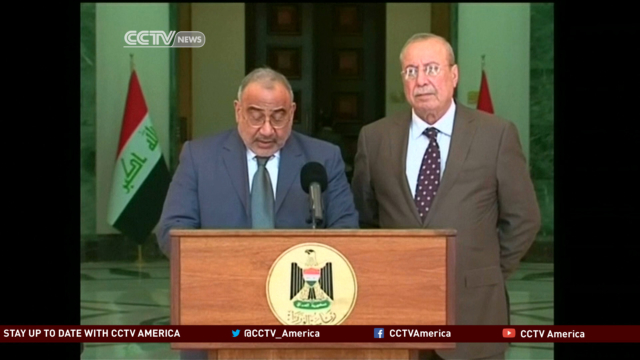Iraq’s central government struck a deal Tuesday with the semi-autonomous Kurdish region in the north over the export of oil from Kurdish territory. If implemented, the deal could provide much-needed revenue for Baghdad and unite the country in the fight against the terrorist group ISIL. CCTV America’s Nathan King reported this story.

Kurdish fighters known as peshmerga have borne the brunt of the conflict against ISIL in northern Iraq. But the fight also exacerbated the divisions with the central government in Baghdad, especially over sharing Iraq’s oil wealth.
For more than a year, the Iraqi government withheld payments to the Kurds in retaliation for their exporting oil unilaterally through Turkey. The Kurds were also planning a referendum on independence.
An agreement could change all that.
Under the deal, the Kurdish authorities will release 550,000 barrels of oil a day from their territory to the central government. 300,000 barrels will come from the disputed area of Kirkuk, and the rest will be exported via pipeline to Turkey.
Iraq’s Oil Minister Adel Abdul-Mahdi said in a televised statement on Tuesday that joint committees will be formed to follow up with the implementation of the agreement, and that oil from both areas would run through a Kurdish Regional Government’s (KRG) pipeline to Turkey.
“A deal between the federal government and the government of the region on the pending issues in the budget and its law and on the issue of oil, affirming that oil is for all Iraqis,” he said.
The Kurdish government will also help to link the Kirkuk oil fields to its pipeline to Turkey because the original pipeline was destroyed and is under Islamic State control.
In return for the oil, Baghdad will give the Kurds 17 percent of the national budget, which in 2014 was about $12 billion.
Baghdad will also add $1 billion to pay and equip peshmerga forces. The Details were still to be worked out, not the least of which were the future of the oil-rich area around the city of Kirkuk. Kurdish fighters took over the city after Iraqi forces fled in June as ISIL advanced. Kurdish forces have given no sign they will withdraw from the area.
But the fact that this deal was agreed to at all may be a vindication for Iraq’s new Prime Minister Haider al-Abadi, and that he’s seen as more of a reconciler than his predecessor Nuri al-Maliki was.
The U.S. government immediately welcomed the deal as good news on bringing the country together to fight ISIL.
Story includes reporting from Reuters and The Associated Press.
 CGTN America
CGTN America
